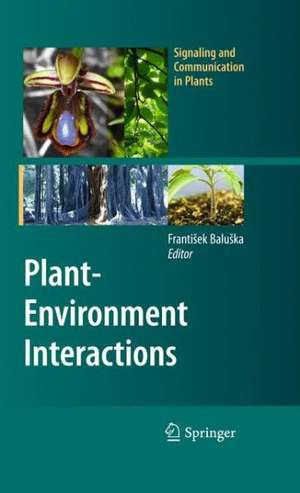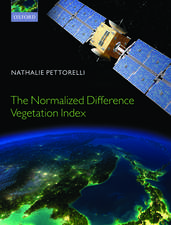Plant-Environment Interactions: From Sensory Plant Biology to Active Plant Behavior: Signaling and Communication in Plants
Editat de František Baluškaen Limba Engleză Hardback – 14 apr 2009
| Toate formatele și edițiile | Preț | Express |
|---|---|---|
| Paperback (1) | 945.62 lei 6-8 săpt. | |
| Springer Berlin, Heidelberg – 28 oct 2010 | 945.62 lei 6-8 săpt. | |
| Hardback (1) | 796.83 lei 38-44 zile | |
| Springer Berlin, Heidelberg – 14 apr 2009 | 796.83 lei 38-44 zile |
Din seria Signaling and Communication in Plants
- 15%
 Preț: 641.71 lei
Preț: 641.71 lei - 24%
 Preț: 793.47 lei
Preț: 793.47 lei - 24%
 Preț: 1208.95 lei
Preț: 1208.95 lei - 18%
 Preț: 1118.13 lei
Preț: 1118.13 lei - 24%
 Preț: 783.53 lei
Preț: 783.53 lei - 18%
 Preț: 1111.53 lei
Preț: 1111.53 lei - 18%
 Preț: 998.34 lei
Preț: 998.34 lei - 18%
 Preț: 1545.57 lei
Preț: 1545.57 lei - 18%
 Preț: 1547.81 lei
Preț: 1547.81 lei - 18%
 Preț: 951.29 lei
Preț: 951.29 lei - 18%
 Preț: 942.63 lei
Preț: 942.63 lei - 18%
 Preț: 1219.77 lei
Preț: 1219.77 lei - 18%
 Preț: 954.31 lei
Preț: 954.31 lei - 18%
 Preț: 953.20 lei
Preț: 953.20 lei - 18%
 Preț: 1388.05 lei
Preț: 1388.05 lei - 18%
 Preț: 956.50 lei
Preț: 956.50 lei - 18%
 Preț: 942.63 lei
Preț: 942.63 lei - 18%
 Preț: 943.73 lei
Preț: 943.73 lei - 24%
 Preț: 1053.39 lei
Preț: 1053.39 lei - 18%
 Preț: 941.48 lei
Preț: 941.48 lei - 18%
 Preț: 943.57 lei
Preț: 943.57 lei - 18%
 Preț: 943.43 lei
Preț: 943.43 lei - 18%
 Preț: 944.51 lei
Preț: 944.51 lei - 18%
 Preț: 945.30 lei
Preț: 945.30 lei - 18%
 Preț: 1221.07 lei
Preț: 1221.07 lei - 18%
 Preț: 944.19 lei
Preț: 944.19 lei - 18%
 Preț: 948.92 lei
Preț: 948.92 lei
Preț: 796.83 lei
Preț vechi: 1048.47 lei
-24% Nou
Puncte Express: 1195
Preț estimativ în valută:
152.47€ • 159.62$ • 126.16£
152.47€ • 159.62$ • 126.16£
Carte tipărită la comandă
Livrare economică 03-09 aprilie
Preluare comenzi: 021 569.72.76
Specificații
ISBN-13: 9783540892298
ISBN-10: 354089229X
Pagini: 320
Ilustrații: X, 308 p. 35 illus., 3 illus. in color.
Dimensiuni: 155 x 235 x 25 mm
Greutate: 0.63 kg
Ediția:2009
Editura: Springer Berlin, Heidelberg
Colecția Springer
Seria Signaling and Communication in Plants
Locul publicării:Berlin, Heidelberg, Germany
ISBN-10: 354089229X
Pagini: 320
Ilustrații: X, 308 p. 35 illus., 3 illus. in color.
Dimensiuni: 155 x 235 x 25 mm
Greutate: 0.63 kg
Ediția:2009
Editura: Springer Berlin, Heidelberg
Colecția Springer
Seria Signaling and Communication in Plants
Locul publicării:Berlin, Heidelberg, Germany
Public țintă
ResearchCuprins
Mechanical Integration of Plant Cells.- Root Behavior in Response to Aluminum Toxicity.- Communication and Signaling in the Plant–Fungus Symbiosis: The Mycorrhiza.- Role of g -Aminobutyrate and g -Hydroxybutyrate in Plant Communication.- Hemiparasitic Plants: Exploiting Their Host’s Inherent Nature to Talk.- Host Location and Selection by Holoparasitic Plants.- Plant Innate Immunity.- Airborne Induction and Priming of Defenses.- Chemical Signaling During Induced Leaf Movements.- Aposematic (Warning) Coloration in Plants.- Deceptive Behavior in Plants. I. Pollination by Sexual Deception in Orchids: A Host–Parasite Perspective.- Deceptive Behavior in Plants. II. Food Deception by Plants: From Generalized Systems to Specialized Floral Mimicry.- Cognition in Plants.- Memorization of Abiotic Stimuli in Plants: A Complex Role for Calcium.- Plants and Animals: Convergent Evolution in Action?.
Recenzii
From the reviews:“The main thesis of this book is that plants monitor and integrate many abiotic and biotic parameters in their environment. … The scientific references cited are up-to-date. … The authors attempt to use an integrative approach to synthesizing the literature to demonstrate the dynamic nature of plants. With its diverse topics, this book would provide a valuable overview in advanced graduate classes in plant biology. Summing Up: Recommended. Academic collections, upper-division undergraduate through researchers/faculty.” (J. Z. Kiss, Choice, Vol. 47 (4), December, 2009)
Textul de pe ultima copertă
Our image of plants is changing dramatically away from passive entities merely subject to environmental forces and organisms that are designed solely for the accumulation of photosynthate. Plants are revealing themselves to be dynamic and highly sensitive organisms that actively and competitively forage for limited resources, both above and below ground, organisms that accurately gauge their circumstances, use sophisticated cost-benefit analysis, and take clear actions to mitigate and control diverse environmental threats. Moreover, plants are also capable of complex recognition of self and non-self and are territorial in behavior. They are as sophisticated in behavior as animals but their potential has been masked because it operates on time scales many orders of magnitude less than those of animals. Plants are sessile organisms. As such, the only alternative to a rapidly changing environment is rapid adaptation. This book will focus on all these new and exciting aspects of plant biology.
Caracteristici
Covering new and exciting aspects of communication and behaviour in plants











